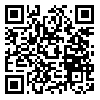Volume 10, Issue 3 (12-2018)
2018, 10(3): 85-92 |
Back to browse issues page
Download citation:
BibTeX | RIS | EndNote | Medlars | ProCite | Reference Manager | RefWorks
Send citation to:



BibTeX | RIS | EndNote | Medlars | ProCite | Reference Manager | RefWorks
Send citation to:
Eslami M, Khosravi Z, Cheragh Molayi L, Zahrayi S. Anticipation of the Type of Ego Defensive Styles through Alexithymia and Anger Rumination and their Difference between Men and Women. North Khorasan University of Medical Sciences 2018; 10 (3) :85-92
URL: http://journal.nkums.ac.ir/article-1-1596-en.html
URL: http://journal.nkums.ac.ir/article-1-1596-en.html
1- PhD Student of General Psychology, Department of Psychology, Alzahra University, Tehran, Iran , isma232000@yahoo.com
2- Professor, Department of Psychology, Alzahra University, Tehran, Iran
3- Assistant Professor, Department of Psychology, Alzahra University, Tehran, Iran
2- Professor, Department of Psychology, Alzahra University, Tehran, Iran
3- Assistant Professor, Department of Psychology, Alzahra University, Tehran, Iran
Abstract: (4707 Views)
Introduction: Defensive styles have a very important role in the study of personality and social exchanges. Awareness of emotions and memories related to anger is also very influential in this regard. Therefore, identification and communication of thoughts and feelings for long-term psychological adjustment is very important. The purpose of this study was to predict the type of Ego defensive styles with Alexithymia and anger rumination between male and female.
Methods: For this purpose, a sample of 348 students (153 girls, 195 boys) as the quotas sampling were selected among students. For data gathering, Andrews's Defense Styles Questionnaire, Toronto Alexithymia Scale, and Sakhodlolsky Anger rumination scale were used. The statistical methods used in this study are multivariate regression and Mann-Whitney test.
Results: Suggests that: in immature Defense style, predictive variables of Alexithymia and gender are predicted to be 40% percent of variance. In the neurotic defensive style, all three variables (gender and Alexithymia and anger rumination) predict 0.14 percent of variance. Also, according to Mann Whitney's test, the mean Alexithymia was higher in men than in women (P < 0.01). There was not a significant difference between male and female anger rumination variables (P > 0.5).
Conclusions: Alexithymia and anger rumination are effective in the use of immature and neurotic defensive styles. Also, the lack of emotional awareness and alexithymia in men is more than women, which can be the cause of many psychological and physical disorders. Therefore, the training required for men in this regard is emphasized. Conclusion: Alexithymia and lack of awareness of feelings and difficulty in expressing them among men are more than women, and it is advisable to minimize the number of different training courses for men. It will, therefore, create communication issues in the workplace and in personal life.
Methods: For this purpose, a sample of 348 students (153 girls, 195 boys) as the quotas sampling were selected among students. For data gathering, Andrews's Defense Styles Questionnaire, Toronto Alexithymia Scale, and Sakhodlolsky Anger rumination scale were used. The statistical methods used in this study are multivariate regression and Mann-Whitney test.
Results: Suggests that: in immature Defense style, predictive variables of Alexithymia and gender are predicted to be 40% percent of variance. In the neurotic defensive style, all three variables (gender and Alexithymia and anger rumination) predict 0.14 percent of variance. Also, according to Mann Whitney's test, the mean Alexithymia was higher in men than in women (P < 0.01). There was not a significant difference between male and female anger rumination variables (P > 0.5).
Conclusions: Alexithymia and anger rumination are effective in the use of immature and neurotic defensive styles. Also, the lack of emotional awareness and alexithymia in men is more than women, which can be the cause of many psychological and physical disorders. Therefore, the training required for men in this regard is emphasized. Conclusion: Alexithymia and lack of awareness of feelings and difficulty in expressing them among men are more than women, and it is advisable to minimize the number of different training courses for men. It will, therefore, create communication issues in the workplace and in personal life.
Type of Study: Orginal Research |
Subject:
Clinical
Received: 2018/07/22 | Accepted: 2018/10/29 | Published: 2018/12/24
Received: 2018/07/22 | Accepted: 2018/10/29 | Published: 2018/12/24
Send email to the article author
| Rights and permissions | |
 |
This work is licensed under a Creative Commons Attribution-NonCommercial 4.0 International License. |






